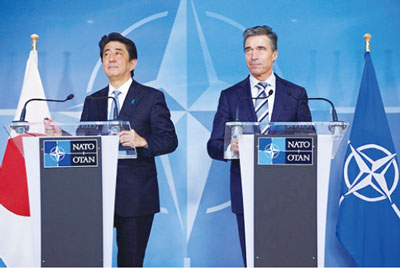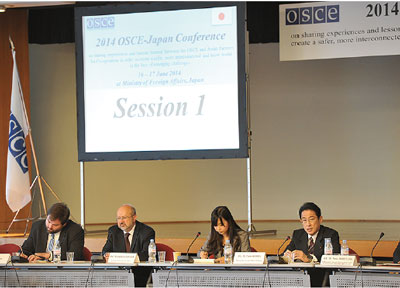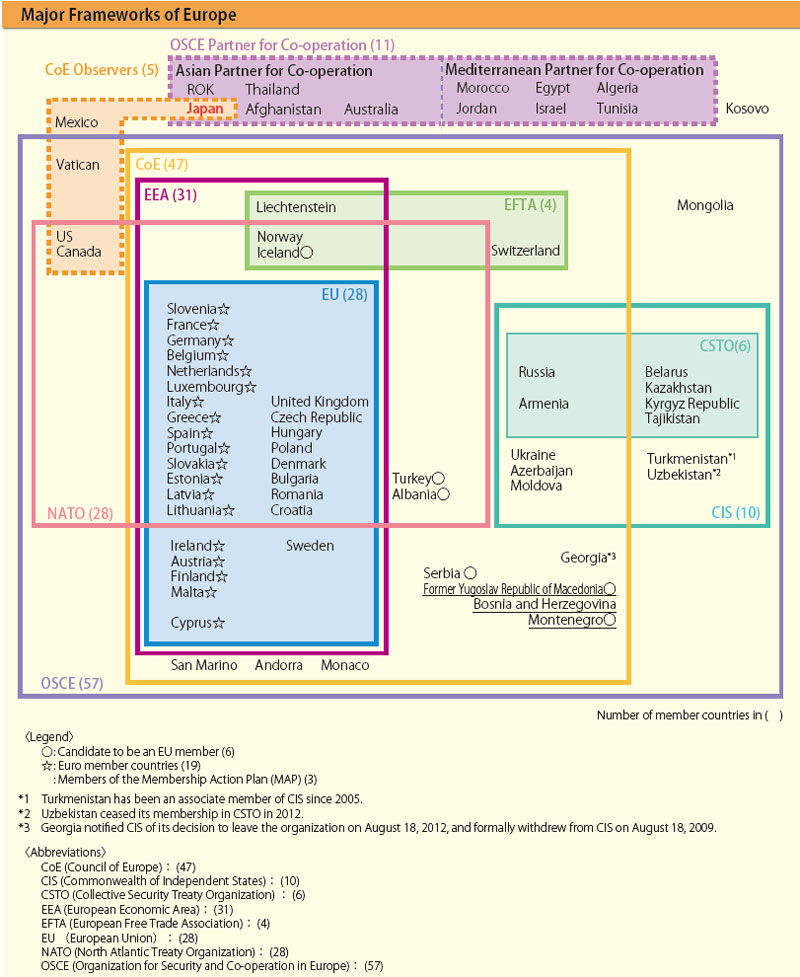Diplomatic Bluebook 2015
Chapter 2
Japan’s Foreign Policy that Takes a Panoramic Perspective of the World Map
2.Cooperation with European Regional Organizations
(1) Cooperation with the North Atlantic Treaty Organization (NATO)
NATO is a military alliance aimed at collective defense of its 28 member countries. The alliance also works on assistance to Afghanistan, anti-piracy measures off the coast of Somalia and other crisis management, prevention of conflict and stabilization after conflict outside the area in order to eliminate direct threats to the security of the territory and people of the member countries. The International Security Assistance Force (ISAF) that had been deployed in Afghanistan since 2001 pulled out of the country by the end of 2014 and a new mission started in January 2015 with the objective of supporting capacity building of Afghan security forces and others.
Japan and NATO member countries are partners sharing basic values. Japan values cooperation with NATO for practice of Proactive Contribution to Peace. Prime Minister Abe visited NATO Headquarters in May 2014, met with then NATO Secretary General Rasmussen, and delivered a speech at the North Atlantic Council, as the second speech by a prime minister of Japan after seven years. In this speech, the prime minister stressed that Japan and NATO are “reliable natural partners” corroborated by concrete actions. Prime Minister Abe and Secretary General Rasmussen signed the Individual Partnership and Cooperation Programme (IPCP) identifying concrete areas of Japan-NATO cooperation and agreed to promote concrete cooperation with focus on anti-piracy measures and mainstreaming of the perspective of women based on the IPCP. To that end, a joint exercise of the JSDF and NATO Ocean Shield Operation forces for anti-piracy activities was implemented off the coast of Somalia and the Gulf of Aden after September and Japan dispatched female SDF personnel to NATO Headquarters in December for a two-year mission.
 Joint press conference by Prime Minister Abe and Secretary General Rasmussen when the minister visited NATO Headquarters (Brussels, May 6; Source: Cabinet Public Relations Office)
Joint press conference by Prime Minister Abe and Secretary General Rasmussen when the minister visited NATO Headquarters (Brussels, May 6; Source: Cabinet Public Relations Office)
Japan cooperates with NATO also for stabilization of Afghanistan and its surrounding countries. Specifically, Japan supports healthcare and education activities of the Afghan National Army (ANA) through the NATO ANA Trust Fund and also contributes to unexploded bomb disposal in Tajikistan through the NATO Partnership for Peace (PfP). Foreign Minister Kishida visited Belgium in January 2015, met with Secretary General Stoltenberg who assumed the office in October, and confirmed promotion of cooperation between Japan and NATO.
(2) Cooperation with the Organization for Security and Co-operation in Europe (OSCE)
OSCE, which has 57 member countries from Europe, Central Asia and North America, is a regional security organization to prevent conflicts and build confidence in the region through a comprehensive approach. Japan has been involved in OSCE activities as an “Asian Partner for Co-operation” since 1992. OSCE has been playing an important role for stabilization of situations in Ukraine. Japan dispatched experts to the OSCE Election Observation Missions for Ukrainian presidential election in May and the Supreme Council election in October. Japan also financially supported the deployment of the OSCE National Dialogue Project in Ukraine and the OSCE Special Monitoring Mission to Ukraine. Masaharu Kono, Special Representative of the Government of Japan for the Middle East and Europe, attended the OSCE Ministerial Council held at Basel in December and presented Japan’s contribution to OSCE activities. In June, OSCE-Japan Conference was held jointly by the two parties to confirm that the security environment of Europe and that of Asia are inseparable, that the two regions are facing common global issues and that the two regions can learn much from each other and deepen cooperation. Japan also supports other OSCE activities including terrorism prevention by strengthening border management1 through our contribution to Border Management Staff College and support to female entrepreneurs in Central Asia.
 Foreign Minister Kishida speaking at Japan-OSCE Conference (Tokyo, June 16)
Foreign Minister Kishida speaking at Japan-OSCE Conference (Tokyo, June 16)
(3) Cooperation with Council of Europe (CoE)
CoE is a regional organization of 47 member countries and fulfills an important role in establishing international standards in the fields of democracy, human rights and rule of law. As the only observer from Asia, Japan makes active contributions to various activities of CoE. First, Japan financially supported and dispatched experts to the “Conference on Article 15 (of the Convention on Cybercrime) safeguards and criminal justice access to data”2 (in Strasbourg) held in June. Japan also dispatched experts to the 3rd “World Forum for Democracy” (in Strasbourg) held in November. In April, Japan further financially assisted CoE’s assistance to the Ukrainian presidential election, etc. as part of support to restore democracy in Ukraine.

- 1 Border Management Staff College (BMSC) provides border administration leaders of OSCE member and partner countries with education and training on the latest concerns related to border administration, especially comprehensive approaches to ensure safety, democratization reform and action against cross-border threats. Since 2008, the college has provided 12 staff courses and 84 specialized training courses, seminars, workshops, etc. helping capacity building of a total of 2,057 people from 39 countries’ various ministries and agencies involved in border administration.
- 2 Conference of officials of criminal justice and data protection authorities to discuss efficient ways to obtain electronic evidence necessary for investigation of crimes in cyberspace in line with rule of law and European Data Protection Regulations.
